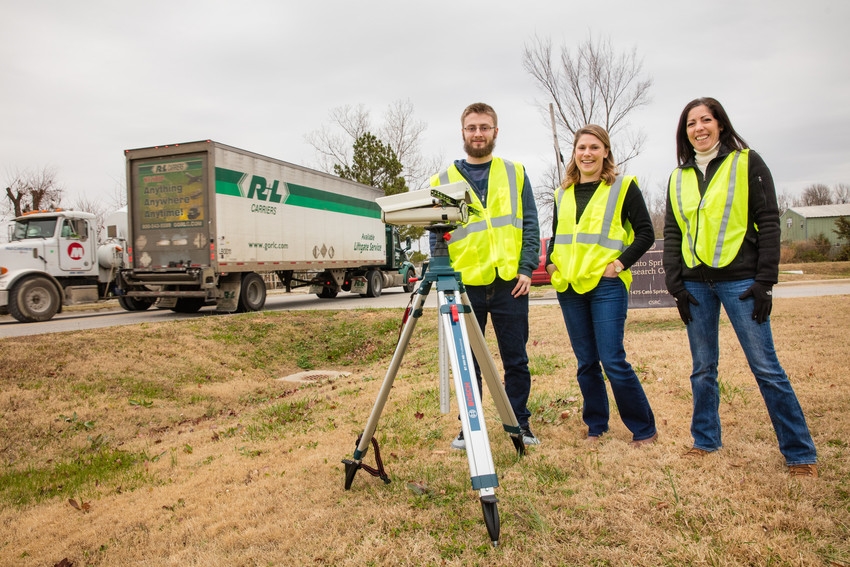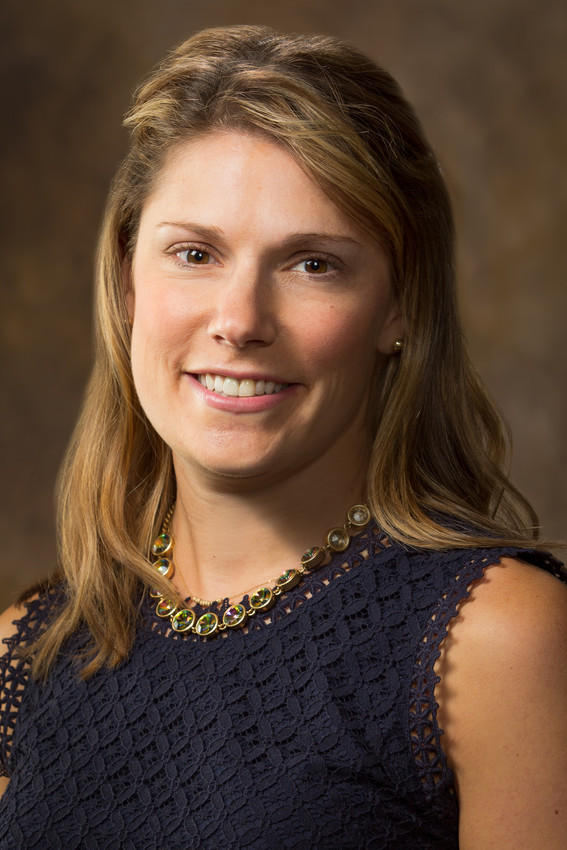Interdisciplinary Team Awarded $1.5 Million to Study Freight Movement

Sarah Hernandez (center) stands next to students Collin Burris and Magdalena Asborno and a prototype LiDAR sensor. The low-cost sensor is capable of classifying trucks by body configuration, providing critical information for freight flow forecasting.
FAYETTEVILLE, Ark. – An interdisciplinary team of researchers at the University of Arkansas has been awarded $1.5 million to develop a new traffic-sensing technology to track cargo as it moves through roadways and ports. The project will help business leaders and government agencies better plan for future investments in infrastructure and economic development.
The project, led by Sarah Hernandez, assistant professor of civil engineering, is unique because it allows researchers to monitor commodity movement without having to stop traffic or cut into roadways to install equipment. Using a combination of LiDAR and video sensing, U of A researchers have developed an algorithm that can distinguish among trailer types, including container, platform, livestock, dump and others, to provide unique insights into commodity flows along a roadway or port.
Similar to radar, LiDAR uses pulsed, infrared laser light to detect distant objects and measure the distance to those objects.
“Our inland waterways move a significant amount of freight and rely equally on efficient water- and land-side transportation systems,” Hernandez said. “This project will provide detailed truck volume data for the roads used to access inland waterway ports. With this data we can better design pavements, manage port operation and direct funds to support better highway connectivity.”
Hernandez said the project will help build efficiencies through better understanding of how water and truck transport systems interact.
 |
| Sarah Hernandez, assistant professor of civil engineering |
The research is led by an interdisciplinary team composed of faculty, research associates and students from the departments of civil engineering, computer science and computer engineering, and the Center for Advanced Spatial Technologies.
The team’s goal is to develop a network of interconnected data collection systems to monitor and manage inland waterway activity including port and terminal operations, vessel movements and vehicle activity.
“The low-cost sensor developed in this project has the potential to deploy across the U.S. so state transportation agencies and private industry can better understand the demand and usage of critical inland waterways and supporting highway infrastructure,” she said. “What’s currently missing in decisions regarding multi-modal water and truck investments is a clear understanding of how the two modes interact. This research, through our specialized traffic sensor, will inform multimodal system operations and management.”
Hernandez said the team’s research will help generate data to drive future policy decisions.
“This project will develop a traffic sensor that measures truck activity in such a way that trucks, drivers and fleets remain anonymous but still provide the level of data needed to create policy and prioritize transportation investments for efficient freight movement,” she said. “Public transportation agencies and private firms and operators need to understand when, where and what freight is moving. This information can be used to design targeted policies to promote critical industries and to identify and select infrastructure projects that support critical or underserved industries.”
The funding was awarded by Inter-Modal Holding LLC, a holding company specializing in transportation, commerce, technology and related infrastructure. The team’s study will focus on the Upper Ohio River Valley region, a major transportation system for the United States. The original work was sponsored by the Maritime Transportation Research and Education Center, known as MarTREC.
Hernandez said the project requires expertise from across campus to meet the full need.
“This team is very much interdisciplinary consisting of civil engineers, computer scientists and computer engineers, geographers and photogrammetry experts,” she said. “The sensor we are designing requires hardware and software development that has to meet highway and traffic standards. There are also aspects related to communications protocols, power adaptation and field data collection. This means we need to pool expertise from a broad and diverse team.”
About the University of Arkansas: The University of Arkansas provides an internationally competitive education for undergraduate and graduate students in more than 200 academic programs. The university contributes new knowledge, economic development, basic and applied research, and creative activity while also providing service to academic and professional disciplines. The Carnegie Foundation classifies the University of Arkansas among fewer than 3% of colleges and universities in America that have the highest level of research activity. U.S. News & World Report ranks the University of Arkansas among its top American public research universities. Founded in 1871, the University of Arkansas comprises 10 colleges and schools and maintains a low student-to-faculty ratio that promotes personal attention and close mentoring.
Contacts
Nick DeMoss, director of communications
College of Engineering
479-575-5697,
ndemoss@uark.edu